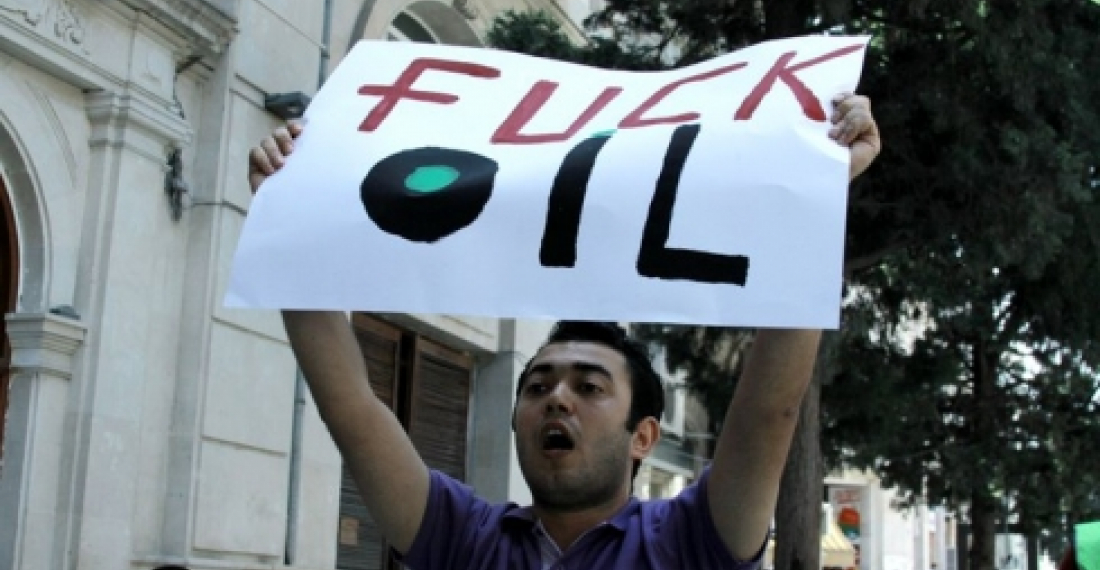Azerbaijani activists have used social media sites to mock some of the recent statements by European leaders on the human rights situation in Azerbaijan which they consider inadequate. But is it the Azerbaijani government which should now be "seriously concerned".
Over the last few days Azerbaijan has been criticised by a number of European politicians and government leaders for its human rights record, and particularly the arrest and questioning of activists. The criticism comes as Azerbaijan prepares to take over on May 14th the Chairmanship of the Council of Europe. The Council of Europe is considered to be the foremost inter-state institution overseeing respect for human rights on the European continent.
On Monday (5 May), EU High Representative Catherine Ashton and Enlargement Commissioner Stefan Fule issued a joint statement:
"The High Representative and Commissioner are deeply concerned to note the detention on 19 April of Rauf Mirkadirov and the circumstances of the interrogation on 29 April of Arif Yunus and Leyla Yunus, well known human rights defenders in Azerbaijan. They note that steps taken by the Azerbaijani authorities in recent weeks seem to target civil society activists who are campaigning for greater respect for human rights, rule of law and fundamental freedoms in Azerbaijan as well as for a people - to - people dialogue as an essential component of reconciliation and conflict resolution. These are areas which lie at the heart of the EU's policy in the region. The EU calls upon the government of Azerbaijan to promote a national discourse in a spir it of inclusivity, in line with its responsibility as the incoming Chair of the Council of Europe's Committee of Ministers. In particular, the EU urges the government of Azerbaijan to honour the obligations and commitments Azerbaijan subscribed to as a member of the Council of Europe and to act upon the recommendations of the Council of Europe's Commissioner for Human Rights, Nils Muižnieks, in his recently published report on Azerbaijan."
However within hours of the statement being issued, a court in Azerbaijan sentenced several young people to long term prison sentences for trying to organise peaceful protests last year. This triggered further reaction. In a statement, Britain's Minister for Europe, David Lithington stated in a statement issued on Tuesday (6 May),
I am deeply concerned by the sentences of 6-8 years imprisonment passed to eight members of the Azerbaijani NIDA Civic Youth Movement. We have monitored these cases closely throughout the trial. The Foreign Secretary raised his concerns about the detention of members of the NIDA Youth Movement during his visit to Baku in December 2013.
I am particularly concerned by reported shortcomings during the trials of these activists for the alleged organisation of mass disorder and illegal possession of firearms and narcotics. The UK will continue to raise its concerns about an increasingly worrying trend of apparently politically motivated detentions and prison sentences being issued in Azerbaijan.
The Government of Azerbaijan has dismissed the accusations, describing the criticism in the statement by Ashton and Fule as "absolutely unacceptable". A report by the APA news agency on Tuesday quoted the head of the press service of the Azerbaijani Foreign Ministry Elman Abdullayev as saying that:
"the joint Statement was of a political nature falls short of the reality on the ground, and is an attempt to distort the true sense of the legal proceedings instituted with regard to Rauf Mirkadirov and call of Leyla Yunusova and Arif Yunusov as witnesses in this process." He noted that investigation launched by the General Prosecutor's Office of the Republic of Azerbaijan is not related to their journalistic or civil society activities.
"While the case is under the investigation, any early judgments and politically motivated statements are nothing but attempts to interfere into and to exert pressure on the investigation. It is also absolutely unacceptable from the rule of law's point of view. As it is well-known, Azerbaijan has always been supportive to inter-communal dialogue between Azerbaijani and Armenian communities of the Nagorno-Karabakh region of the Republic of Azerbaijan. We believe that such a dialogue conducive to mutual understanding and confidence, will significantly contribute to the peace process as a whole."
In the meantime human rights activists in Azerbaijan have taken to social media sites mocking the overuse of the word "concerned" by European officials and politicians when describing the situation in Azerbaijan, and insisting that the response is inadequate given the gravity of the situation.
Commonspace.eu political editor said in a comment,
There is no doubt that the frequent use of the word "concerned" in official statements, especially those issued by officials of European institutions, have tended to diminish their value. However these statements are not off the cuff comments. They reflect a full analysis of the situation in Azerbaijan by the governments and institutions that are issuing them. In this sense therefore they now define the official position towards the government of Azerbaijan, with implications on all asspects of relations. There is a drip, drip affect that impacts more than simply on Azerbaijan's image. Perhaps it is now the turn of the Government of Azerbaijan to be "seriously concerned".
source: commonspace.eu
photo: Azerbaijani activists blame western dependence on Azerbaijani oil exports for a weak response to the human rights situation. A protestor in Baku makes the point. (Photo courtesy of Turkhan Karimov)







